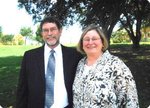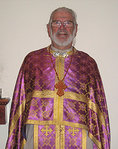Wind: 10.4 mph, S
Welcome to our new web site!
To give our readers a chance to experience all that our new website has to offer, we have made all content freely avaiable, through October 1, 2018.
During this time, print and digital subscribers will not need to log in to view our stories or e-editions.


From Fr. Gabriel Rochelle, pastor of St Anthony of the Desert Orthodox Mission, Las Cruces (http://stanthonylc.org):
Rituals are markers in time as old as humanity’s emergence into consciousness. Rituals, music and art are the pieces that fit together to make up the jigsaw puzzle of an intelligible life. Rituals divide time into manageable units, like flags planted in the ground of our days, weeks, months and years. Rituals bind us back to the source of our being.
In the topsy-turvy time we are experiencing, it will be important for you to maintain as much of your ritual as you can, because it will help you navigate the upside-down quality of your days and establish some sense of normalcy.
Our spiritual rituals are normally conducted in community, but that is not going to be possible for a while, so you have to compensate for the aloneness. Take refuge in solitude, which is not the same thing as loneliness. Know that others of your community struggle along with you to keep a sense of community. Read texts that would be read, on the days when you would read them, as if you were in church or mosque or synagogue or any other community.
Sing your anthems in the shower or out the window, as people in Italy have been doing. We will get through this. Do not despair.
From Rabbi Larry Karol, Temple Beth-El (https://tbelc.org/):
A few weeks ago, I asked some of our Temple Beth-El Religious School students to comment on several sayings from an ancient collection of statements from the rabbis called Pirkei Avot, which literally means “Chapters of the Fathers/Founders.”
One saying from a first-century sage known as “Hillel the Elder,” said, “If I am not for myself, who will be for me? If I am only for myself, what am I? And if not now, when?”
The interpretations suggested by the students in early February did not take into account the current worldwide health challenge we now face.
What does Hillel’s famous piece of wisdom mean in a time of a pandemic?
I believe that it means that we should advocate for ourselves and our own health and needs, but that we also need to take into account and attend to the needs of others around us. We should do what we can to sustain the well-being of our community with a sense of urgency.
A second saying from Hillel simply declared, “Do not separate yourself from the community.”
I heard someone say recently that we are now “separating together.” While we may not be gathering in public spaces, we still have ways to stay in touch with one another to offer our concern and caring. Technology enables us to reach across a physical distance, providing us with the possibility to see and hear each other, or to read one another’s words that express connection. Religious congregations that have suspended in-person worship for the time being are generating and sharing communal prayer via livestream or pre-recorded video.
Whatever we do, we need to be certain that our actions exude kindness, generosity and compassion. We will get through the COVID-19 pandemic, and we will look back and remember how we reached out to one another with creativity and persistence.
From Rabbi Bery Schmukler, Alevy Chabad Jewish Center de Las Cruces (www.ChabadLC.org)
I suggest (and ask) that each of us make it our business each day to reach out to five people in the community just to say hi and see how they're doing. At times like this we need each other. Lifting up one another is the most uplifting thing we can do for ourselves. Remember to wash your hands, and in whose hands you are.
And remember: "TRACHT GUT VET ZEIN GUT – THINK GOOD, AND IT'LL BE GOOD."